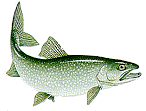
Lake Trout
Common Names-Laker, gray trout.
Description-Deeply forked tail; light spots on a background varying from light green or gray, to dark green, brown or black; light spots cover the head.
Table Quality-Excellent when eaten fresh or smoked. But the high fat content causes the flesh to turn rancid when frozen over long periods. Depending on the fish's diet, the meat can vary from bright orange to off-white.
Sporting Qualities-Lake trout do not leap, but instead wage a strong, determined underwater battle. Many are taken by trolling with spoons or minnow-like plugs attached to rigs or downriggers. They can also be taken jigging with whole or cut fish, or with a variety of spoons/jigs suited for deep water jigging.
A variety of techniques are used in Manitoba's northwest (lake trout are road accessible here) country. Sucker chum is commonly used in a search and attract methodology used in this area. Hooks/jigs will be left on the bottom for foraging lake trout to pick up.
Habitat-Lake trout require cold, clear, well-oxygenated water, so they are found almost exclusively in oligotrophic lakes. In summer they often move to depths of 50 - 100 feet, but in spring and fall you can find them at depths of 20 feet or less. They prefer water from 48' to 52'F.
Food Habits- In most waters, lake trout rely heavily on small fish like ciscoes, perch or sculpins.
But in some lakes, they feed almost exclusively on plankton, insects or crustaceans. In this situation, lake trout never reach the size of those in fish-eating populations.
Manitoba is blessed with many trophy class lake trout fisheries. On the N.W.T / Manitoba border is Neultin lake, known for its monster lakers and its catch and release policies. The latter is very significant as they fish are extremely old and if removed could not be replaced by another fish of equal status for probably another 75-100 years!. Lake Athapapuskow (a drive to trophy fishery) produces many of Manitoba's top catches. One characteristic of lake trout fisheries is the enormous size of the bodies of water where they can be found. Anglers have to practice caution when in pursuit of these deep water trophies. It goes without saying that the bull-dog fight of a large laker is one that you'll not soon forget..